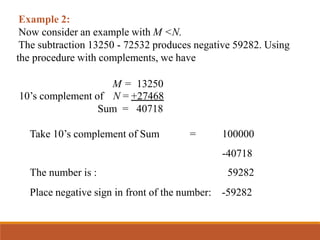Complement in DLD
- 1. Complements Digital Logic Design BY SHEHZAD ALI
- 2. Subtraction using addition Conventional addition (using carry) is easily implemented in digital computers. However; subtraction by borrowing is difficult and inefficient for digital computers. Much more efficient to implement subtraction using ADDITION OF the COMPLEMENTS of numbers.
- 3. Types of Complement There are two types of complements: R’s complement e.g. 2’s complement for base 2 and 10’s complement for base 10 R-1’s complement e.g. 1’s complement for base 2 and 9’s complement for base 10
- 4. Complements of Numbers (r-1 )’s Complement •Given a number N in base r having n digits, •the (r- 1)’s complement of N is defined as ( r n - 1 ) - N •For decimal numbers the base or r = 10 and r- 1= 9, •so the 9’s complement of N is (10n-1)-N •99999……. - N Digit n Digit n-1 Next digit Next digit First digit 9 9 9 9 9 -
- 5. 2- Find the 9’s complement of 546700 and 12389 The 9’s complement of 546700 is 999999 - 546700= 453299 and the 9’s complement of 12389 is 99999- 12389 = 87610. 9’s complement Examples - 5 4 6 7 0 0 9 9 9 9 9 9 4 5 3 2 9 9 - 1 2 3 8 9 9 9 9 9 9 8 7 6 1 0
- 6. l’s complement  For binary numbers, r = 2 and r — 1 = 1,  r-1’s complement is the l’s complement.  The l’s complement of N is (2n - 1) - N. Digit n Digit n-1 Next digit Next digit First digit 1 1 1 1 1 Bit n-1 Bit n-2 ……. Bit 1 Bit 0 -
- 7. l’s complement Find r-1 complement for binary number N with four binary digits. r-1 complement for binary means 2-1 complement or 1’s complement. n = 4, we have 24 = (10000)2 and 24 - 1 = (1111)2. The l’s complement of N is (24 - 1) - N. = (1111) - N
- 8. The complement 1’s of 1011001 is 0100110 - - 1 0 1 1 0 0 1 1 1 1 1 1 1 1 0 1 0 0 1 1 0 The 1’s complement of 0001111 is 1110000 0 0 0 1 1 1 1 1 1 1 1 1 1 1 1 1 1 0 0 0 0 l’s complement
- 9. r’s Complement •Given a number N in base r having n digits, •the r’s complement of N is defined as rn - N. •For decimal numbers the base or r = 10, •so the 10’s complement of N is 10n-N. •100000……. - N Digit n Digit n-1 Next digit Next digit First digit- 1 0 0 0 0 0
- 10. 10’s complement Examples Find the 10’s complement of 546700 and 12389 The 10’s complement of 546700 is 1000000 - 546700= 453300 and the 10’s complement of 12389 is 100000 - 12389 = 87611. Notice that it is the same as 9’s complement + 1. - 5 4 6 7 0 0 4 5 3 3 0 0 - 1 2 3 8 9 1 0 0 0 0 0 8 7 6 1 1 1 0 0 0 0 0 0
- 11. For binary numbers, r = 2, r’s complement is the 2’s complement. The 2’s complement of N is 2n - N. 2’s complement Digit n Digit n-1 Next digit Next digit First digit- 1 0 0 0 0 0
- 12. 2’s complement Example The 2’s complement of 1011001 is 0100111 The 2’s complement of 0001111 is 1110001 - - 1 0 1 1 0 0 1 0 1 0 0 1 1 1 0 0 0 1 1 1 1 1 1 1 0 0 0 1 1 0 0 0 0 0 0 0 1 0 0 0 0 0 0 0
- 13. Fast Methods for 2’s Complement Method 1: The 2’s complement of binary number is obtained by adding 1 to the l’s complement value. Example: 1’s complement of 101100 is 010011 (invert the 0’s and 1’s) 2’s complement of 101100 is 010011 + 1 = 010100
- 14. Fast Methods for 2’s Complement Method 2: The 2’s complement can be formed by leaving all least significant 0’s and the first 1 unchanged, and then replacing l’s by 0’s and 0’s by l’s in all other higher significant bits. Example: The 2’s complement of 1101100 is 0010100 Leave the two low-order 0’s and the first 1 unchanged, and then replacing 1’s by 0’s and 0’s by 1’s in the four most significant bits.
- 15. Examples Finding the 2’s complement of(01100101)2 • Method 1 – Simply complement each bit and then add 1 to the result. (01100101)2 [N] = 2’s complement = 1’s complement (10011010)2 +1 =(10011011)2 • Method 2 – Starting with the least significant bit, copy all the bits up to and including the first 1 bit and then complement the remaining bits. N = 0 1 1 0 0 1 0 1 [N] = 1 0 0 1 1 0 1 1
- 16. Example 1 (Decimal unsigned numbers) perform the subtraction 72532 - 13250 = 59282. M > N : “Case 1” “Do not take complement of sum and discard carry” The 10’s complement of 13250 is 86750. Therefore: M = 72532 10’s complement of N =+86750 Sum= 159282 Discard end carry 105= - 100000 Answer = 59282 no complement
- 17. Example 2: Now consider an example with M <N. The subtraction 13250 - 72532 produces negative 59282. Using the procedure with complements, we have M = 13250 10’s complement of N = +27468 Sum = 40718 Take 10’s complement of Sum = 100000 -40718 The number is : 59282 Place negative sign in front of the number: -59282



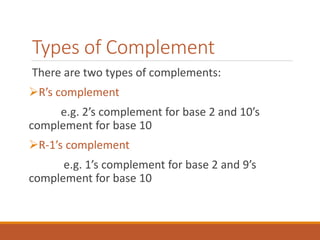
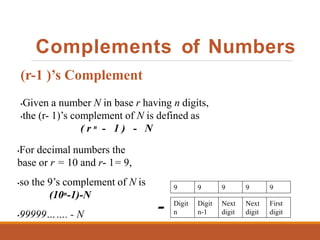

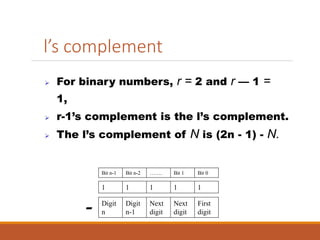
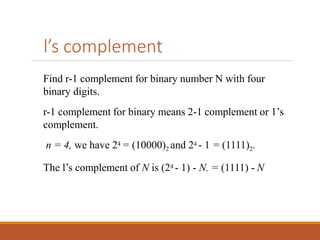
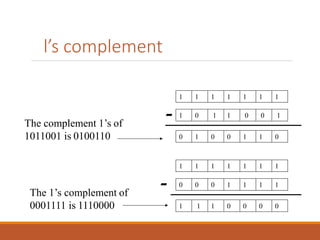
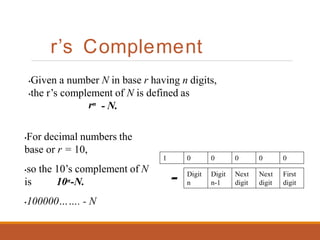
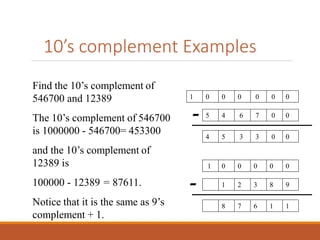


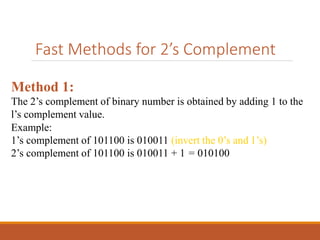
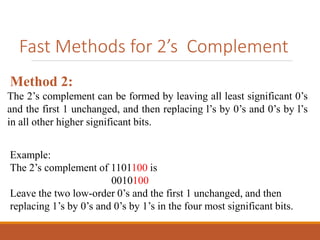
![Examples
Finding the 2’s complement of(01100101)2
• Method 1 – Simply complement each bit and then add
1 to the result.
(01100101)2
[N] = 2’s complement = 1’s complement (10011010)2 +1
=(10011011)2
• Method 2 – Starting with the least significant bit, copy
all the bits up to and including the first 1 bit and then
complement the remaining bits.
N = 0 1 1 0 0 1 0 1
[N] = 1 0 0 1 1 0 1 1](https://image.slidesharecdn.com/complementindld-200626073908/85/Complement-in-DLD-15-320.jpg)

